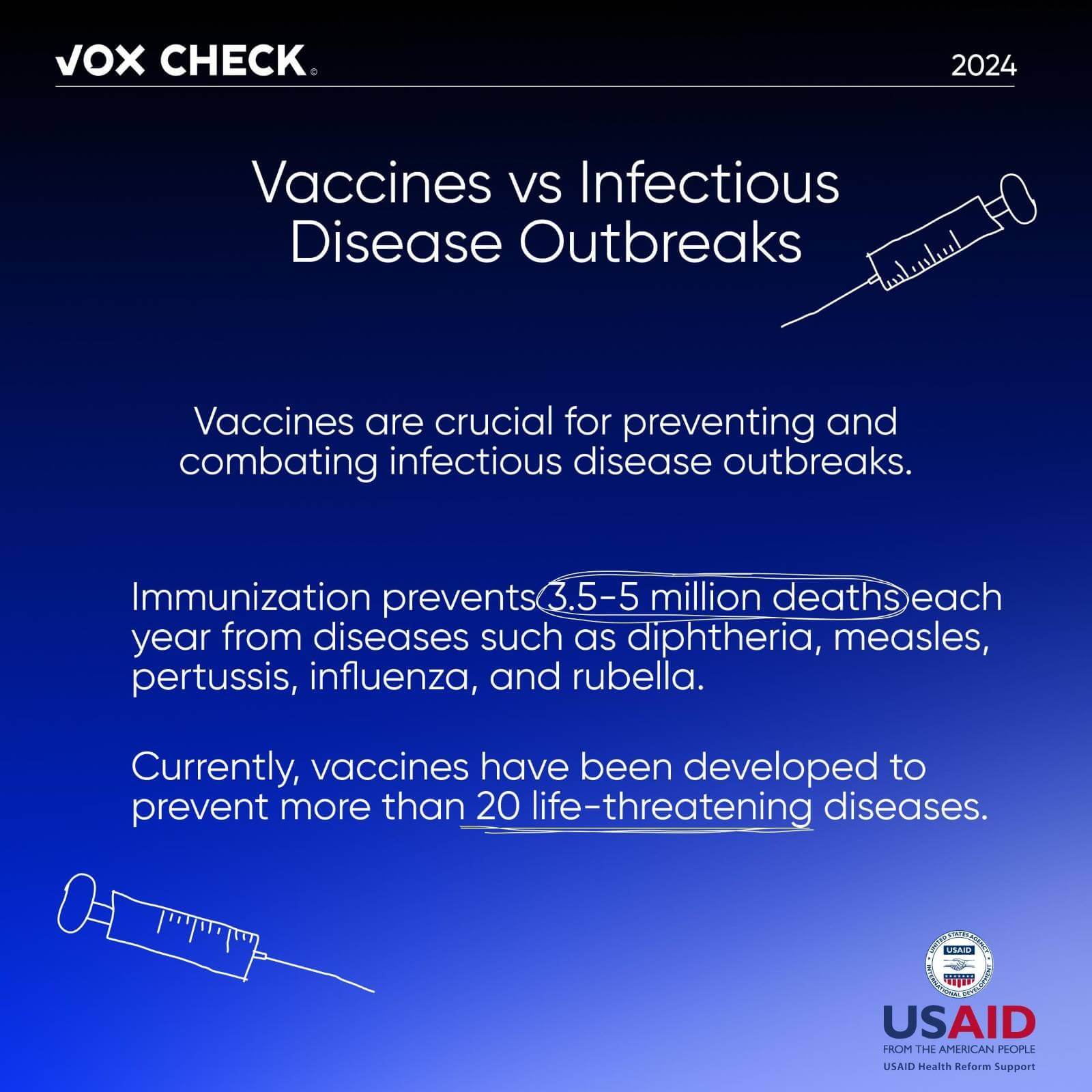Vaccination has helped humanity eradicate smallpox and significantly reduce the mortality rate from a range of other diseases. Some of these are most dangerous for children, whose immune systems are more vulnerable than adults. However, people continue to spread myths that it is beneficial for immunity to “get sick,” and that vaccines are considered as poison.
With the support of the USAID Health Reform Support project, VoxCheck analyzes and refutes public health narratives spread in the information space of Ukraine, Belarus, and russia on a weekly basis.
Information is being spread online claiming that children under 6 years old often get sick precisely because of vaccination. During this period, the body is “cleansing” itself from all the received toxins – doctors describe it as the child “outgrowing” illnesses. Supposedly, science cannot explain this process. It is also stated that children should contract “childhood” diseases, otherwise, there is a risk of more frequent development of cancerous diseases.
What’s the reality?
Children are generally more vulnerable to any infections since their immunity is still developing. Vaccination aims to create immunity before children are exposed to potentially life-threatening diseases. It is vaccination that has helped reduce the level of child mortality from a range of “childhood” diseases.
Source: World Health Organization
Among them is poliomyelitis. Poliomyelitis is an infectious disease that primarily affects children, leading to permanent paralysis of various parts of the body. In the early 1980s, hundreds of thousands of cases of the disease were reported worldwide each year. In response to this, the “Global Polio Eradication Initiative” (GPEI) was established in 1988 to combat the spread of the virus through a global vaccination campaign. Since then, the world has made rapid progress in fighting this disease. Two out of three types of poliovirus have been eradicated worldwide, and the incidence rate has decreased to several hundred cases per year.
Measles is an acute infectious disease caused by a virus from the paramyxovirus family. Measles is one of the most contagious diseases in the world, capable of causing serious complications. Before the introduction of the measles vaccine in 1963 and widespread vaccination, large epidemics occurred approximately every two to three years, resulting in about 2.6 million deaths annually. According to the World Health Organization (WHO) estimates, in 2022, 136,000 people died from measles — mostly children, despite the availability of a safe and effective vaccine. Accelerated immunization efforts by countries, the WHO, the Measles and Rubella Initiative (formerly the Measles and Rubella Initiative), and other international partners successfully prevented 56 million deaths between 2000 and 2021.
Overall, infectious diseases, including malaria, pneumonia, tuberculosis, and diarrhea, remain the leading cause of death in children under 5 years of age, alongside premature and complicated childbirths.
In Ukraine, according to the Immunization Schedule, a child should receive vaccines against diseases such as tuberculosis, hepatitis B, measles, epidemic mumps, rubella, diphtheria, tetanus, pertussis, poliomyelitis, and Haemophilus influenzae type b (Hib) infection. According to statistics from the Center for Public Health, in 2023, almost 85% of children under one year of age were vaccinated against poliomyelitis, 86% at 18 months of age, 82% at 6 years of age, and 79% at 14 years of age. At the same time, from 60% to 70% of children in different age groups received vaccines that they had not been vaccinated with before for various reasons.
Vaccination against measles, mumps, and rubella occurs in 2 stages: first, at one year of age, and later, at six years of age. In 2023, the coverage of MMR-1 vaccine reached 92%, MMR-2 — 87% (among the respective age groups). However, almost 77% of children received their first MMR-1 vaccine at the age of 2 years and older, and MMR-1 (after 7 years) — approximately 91%.
As for the “outgrowing” of diseases by children, doctors have been researching this issue for a long time. This particularly applies to chronic conditions such as diabetes, asthma, attention deficit hyperactivity disorder, arthritis, allergies, eczema, and others. Medical practice proves that some children, due to the development of their immune system, may overcome the disease, but the possibility of its persistence into adulthood remains. However, this does not apply to acute conditions that cause infectious diseases or the complications that develop after them.
The idea that getting sick is better than vaccination is a myth. As explained by the Ministry of Health of Ukraine, if your child gets infected and contracts an infectious disease, they will indeed develop immunity against that disease. However, the infection can lead to complications: paralysis after poliomyelitis, heart damage from diphtheria, liver cancer due to hepatitis B, encephalitis from measles. The risk of complications after an infectious disease is much higher than the risk of adverse effects after vaccination.
This information piece was produced with the assistance of the United States Agency for International Development (USAID), provided on behalf of the people of the United States of America. This article’s content, which does not necessarily reflect the views of USAID, the United States Government, is the sole responsibility of Deloitte Consulting under contract #72012118C00001.
Attention
The authors do not work for, consult to, own shares in or receive funding from any company or organization that would benefit from this article, and have no relevant affiliations



